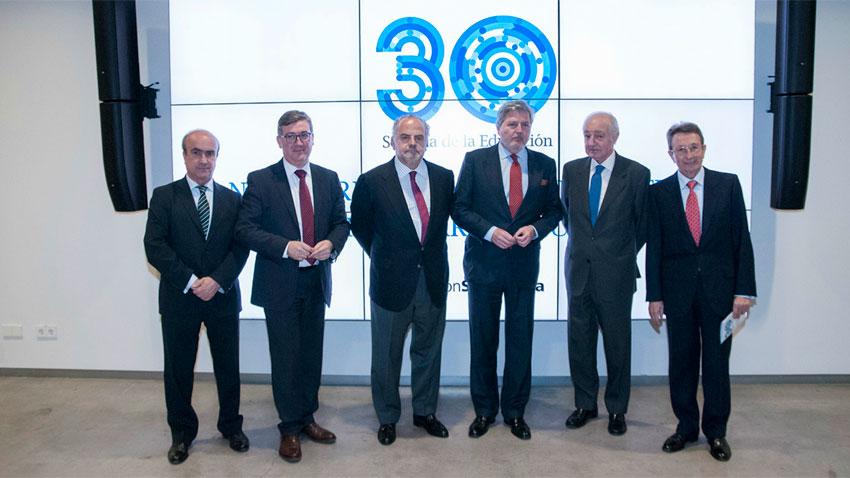Press Releases
Santillana Foundation’s Education Week celebrates its 30th anniversary with a look at the challenges facing the sector and the teaching profession
30-03-2016

From March 8 to 10, leading education experts came together for the thirtieth edition of the Santillana Foundation’s Education Week – "the oldest of the many activities run by this institution," as the Foundation’s president, Ignacio Polanco, reminded participants. On the opening day, Iñigo Méndez de Vigo, acting Minister of Education, made a number of proposals aimed at achieving a pact for education in Spain. Indeed, Méndez de Vigo stressed the need to work towards more than a mere pact, and instead envisaged concrete education goals, such as a guarantee of continuity, a more global scope and greater quality to educate a “free, independent and responsible citizenry”.
The opening session continued with a contribution from the famous expert in Sociology of Education, Professor Mariano Fernández Enguita, on the role of the school in a globalized world, and the transformation and migration to the digital world. His talk was followed by a panel discussion with the analyst on Education Policy at the OECD Marta Encinas-Martín, and Rodrigo Juan García, author of the El País blog Escuelas en Red (Schools on the Network).
The second day brought together the philosopher Victoria Camps; Luis Garicano, economic advisor for Ciudadanos; and former Minister of Education, Ángel Gabilondo. Camps spoke of the importance of defining an ethical framework for educational pacts, while Garicano called for an agreement on shared basics, leaving out "thorny issues" that might be an obstacle to political debate, such as the subjects of Religion and Education for Citizenship, private state-subsidized schools, and linguistic issues in Catalonia. Meanwhile, Ángel Gabilondo considered the pact as absolutely essential for Spain and believed it should be possible to reach an “agreement on the basics". Lopez Rupérez, president of the State School Council, compared the documents submitted by the main political parties after the elections, both that of the Partido Popular and that presented jointly by PSOE and Ciudadanos, and said there were up to seven areas of broad agreement between the two proposals, such as policies for ensuring an inclusive and integrated education system, or aimed at improving the system of grants and strengthening policies focused on teachers.
The week ended on Thursday 10 with a session dedicated to the teaching profession, where José Antonio Marina, renowned philosopher and educator, and author of the White Paper on the Teaching Profession, spoke of the need to "awaken the teaching profession from nostalgia". He answered questions raised by the journalists specialized in education, Pilar Álvarez and Olga Rodríguez Sanmartín, from the newspapers El País and El Mundo, respectively.
It may interest you



